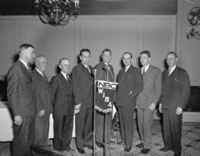
WIBA was Madison’s first commercial radio station, first NBC affiliate, and first station to broadcast on the FM band. Founded in 1924 with a transmitter that broadcast at 100 watts, the station was originally conceived by Madison entrepreneurs Jess Cohen and Harry Myrick, who went to see Tom C. Bowden and William Evjue, the business manager and managing editor, respectively, of the Capital Times newspaper.
Cohen and Myrick had recently purchased radio equipment and were willing to sell two-thirds interest in the station for the moderate sum of nine hundred dollars. Reportedly they approached the Capital Times because they wanted to partner with a newspaper for the purposes of cross promotion with a local ballroom that they owned, called the Strand Theatre. WHA was the only other extant station at that time in Madison. Evjue agreed and became proprietor of WIBA, which he balanced with his duties at the newspaper. In 1926 Cohen and Myrick sold their one-third interest to Augie Paunack and Sol Levitan, who in 1929 sold their interest to the Capital Times. William T. Evjue now possessed complete creative and business oversight over the station. He proved to be a capable manager and owner who stayed with the station until his retirement.
The station originally broadcast from 511 State Street in a corner of the balcony of the University Music Shop. Lynn Matthias, a graduate of the UW engineering school, was hired to take care of the transmitter. Evjue and Matthias later reminisced that they “soon became aware that we had made an investment in a haywire affair,” recollecting that “the original broadcasting thing was a bunch of tubs, resistors, capacitors, and inductors strung out on a bench in a triangular space partitioned off from the dance hall known as the ‘studio'” (“WIBA’s First Pile of Apparatus was Nightmare to Engineer”. Capital Times, uncertain date. Box 1 Folder 1). A lone pipe mast supported the apparatus fifty feet above the studio roof. It was so tenuous that on August 24, 1925 a wind came through strong enough that the entire thing collapsed and had to be completely rebuilt over a three-week period.
Quickly, though, Madisonians picked up on the importance of radio. Thousands reportedly tuned in October of 1925 to hear Robert M. LaFollette Jr.—a family friend of Evjue—discuss his candidacy for the United States Senate. LaFollette won the election, and listened to the returns on WIBA from his farm. Soon after the station gained rights to broadcast the Baseball World Series between the Washington Senators and Pittsburgh Pirates as well as to air UW football games. It later expanded from playing ‘home music talent’ to “spot descriptions of world famous battles, speeches of presidents, prime ministers, the abdication of a king, and the greatest in classical music and the finest drama.” (“WIBA Special Section,” 1950, hand typed note prepared for airtime reading by Evjue for WIBA’s 25th anniversary, Box 1.) By 1928, William Evjue started noon newscasts, which he read from his desk in the Capital Times building.
WIBA became a member of the NBC network on July 19, 1931—a month after the formation of the Badger Broadcasting Company, the new name of the expanding broadcast operation. The relationship with NBC was most successful, consolidating WIBA as the foremost commercial station in Madison. By 1948 WIBA had a proven track record of listenership, with a 51.6% share in the morning, 44.5 share in afternoon, and 56.4 share in the evening. Listenership remained high until the birth of the television era. For the 25th anniversary of the station, in 1950, WIBA received telegrams from all of the major NBC executives commemorating the event, including: Niles Trammel, Chairman of the Board; Joseph McConnell, President; Easton C. Woolley, Director of Radio Station Relations; Charles Denny, host of America’s Town Meeting of the Air; and even Wayne Coy, Chairman of the FCC.
Archive accessions include hundreds of recorded “Hello Wisconsin” audio addresses by Evjue, files and photos, and several boxes of internal correspondence, audience measurement records, numerous newspaper clippings. Of note is a WIBA history written by Evjue for the 50th anniversary celebration.
Digital Documents
Photographs – Wisconsin Historical Society
Governor Philip F. La Follette on WIBA
Radio station master control, 1930
Related Links
